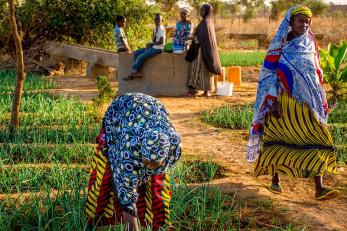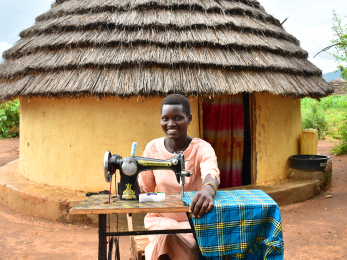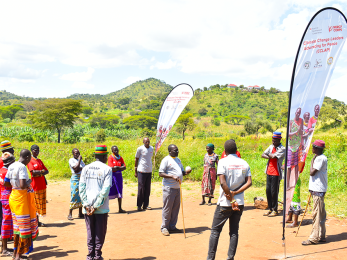Centre Stage or Behind the Scenes?
Measuring and Supporting Women’s Contributions to Peace and Conflict in Central Mali

Download the report (English) (French) ▸
The Women, Peace, and Security (WPS) agenda has been a fixture in peace and conflict discussions through the adoption of U.N. Security Council Resolution (UNSCR) 1325 in 2000. The goal of this agenda is to ensure women’s active participation in peacebuilding efforts, and matters of peace and security overall. However, a consistent challenge for the WPS agenda is adequately measuring and monitoring progress, particularly change that is difficult to measure. Additionally, despite National Actions Plans developed by a number of countries, guidance for designing and implementing community-level WPS programmes is lacking.
To contribute to discussions about designing, implementing, and conducting research on community-level programmes on Women, Gender, Peace, and Security (W/GPS), Mercy Corps conducted research in central Mali in 2022 on the role of women in intercommunal conflicts and local-level peacebuilding. The research finds the following:
- Within the communities included in the research, women make contributions to social cohesion through both formal peacebuilding platforms and “behind the scenes” through other types of social and civic organisations that do not have a specific conflict management mandate,
- Women in central Mali navigate their interpersonal relationships inside and outside the home to influence local conflict and peace initiatives,
- The ability of women to meaningfully participate in formal and informal peacebuilding is shaped by a variety of intersecting identities including age, education, and class,
- The accuracy and validity of measurements of contextual factors and outcome indicators in W/GPS programmes can be diminished by challenges related to security, access, and social pressures that can increase response bias.
From these findings, the report proposes a set of recommendations for future W/GPS programmes and research.
Future W/GPS Programmes should:
- Design W/GPS programs and research with an intersectional approach. Through this approach, programmes can better include women within the same community who have different experiences based on their individual characteristics (like age, marital status, education level, etc).
- Leverage existing peacebuilding practices and roles in communities. Informal or formal peacebuilding mechanisms may already be in place in certain communities, and incorporating them into new programmes could contribute to greater sustainability of peacebuilding efforts.
- Consider supporting the establishment of women’s groups. Even though these groups may not have an explicit peacebuilding function, they can serve as a venue for women to engage in peacebuilding discussions and efforts.
- Engage the household level across the whole community. Women’s roles within the home and intra-household dynamics can influence women’s peacebuilding efforts, highlighting the importance of engaging community members specifically at the household level.
Future W/GPS Research and Evaluations should:
- Adopt a participatory approach. This approach encourages greater inclusion of study participants in the design of the study, data collection, data analysis, and dissemination of findings. These steps will help highlight the community-level interests and promote local ownership and acceptance of research and evaluation.
- Ensure adequate diversity in participant sampling and data disaggregation. This will ultimately lead to a more cohesive understanding of W/GPS among different community members who have diverse life experiences.

